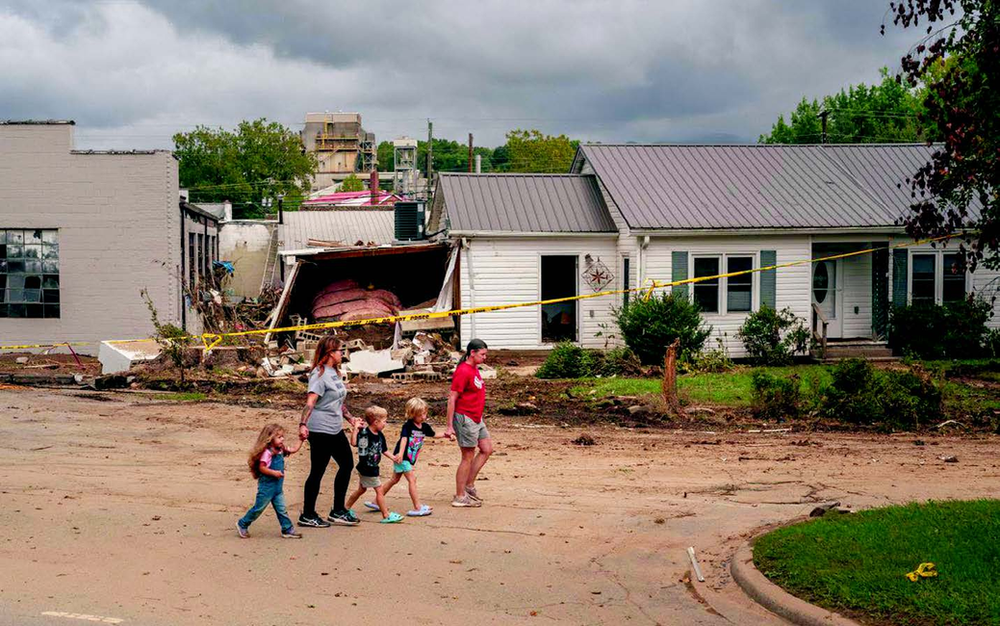
By Jacey Fortin
Rescue teams spread throughout the mountainous areas of North Carolina on Tuesday, combing the landscape for missing individuals and delivering crucial supplies to communities still critically lacking food, water, and electricity following Hurricane Helene.
“The obstacles we face are tremendous,” stated Gov. Roy Cooper during a press briefing on Tuesday, mentioning that there were 92 search-and-rescue units operating statewide.
Over 130 fatalities across six states were linked to the storm, and this figure was anticipated to increase. Almost a third of those deceased were from the area around Asheville, North Carolina, where an unspecified number of individuals remained unlocated as of Tuesday.
The military has joined the ongoing relief and recovery operations. Maj. Gen. Todd Hunt, the leader of the North Carolina National Guard, indicated that 800 soldiers were actively deployed as of Tuesday morning, venturing into more isolated areas of the state. “By this afternoon,” he remarked, “we expect to have guardsmen deployed in each affected county.”
Rescue operations across southern Appalachia faced challenges due to numerous roads that had previously served as vital access points for small mountain communities. Hundreds of roads were inundated, damaged, or obstructed by debris. In certain regions of the Carolinas, electrical power remained limited after flooding from the storm submerged power substations, and mobile service was either unreliable or entirely absent in many areas.
The extent of the destruction prompted both state and federal politicians to use extreme descriptors on Monday. Gov. Brian Kemp of Georgia referred to the storm as “unprecedented.” Cooper characterized the devastation in North Carolina as “unimaginable.” Vice President Kamala Harris labeled the damage “devastating,” and President Joe Biden remarked that the hurricane was “history-defining.”
Biden has pledged long-term assistance, with the White House announcing that he would be traveling to North Carolina and South Carolina on Wednesday. He also indicated intentions to visit Florida and Georgia at the earliest opportunity.
Helene struck land in northwestern Florida on Thursday as a Category 4 hurricane, boasting winds of 140 mph. It induced record storm surges in the Tampa Bay area, caused flash floods in Atlanta, and brought power outages as far north as Cincinnati.
Throughout the South, fierce winds uprooted trees. Tornadoes obliterated homes. Flash floods inundated entire communities, and landslides damaged public infrastructure, including systems for drinking water, which remains a significant concern for emergency responders.
Water systems in the rapidly expanding city of Asheville suffered extensive damage, and officials stated that fully restoring the system could take several weeks. Efforts were underway to transport potable water to the city’s population of 94,000 residents.
“This situation is likely to be a prolonged crisis, due to water system challenges,” Cooper stated on Tuesday.
The Biltmore Estate, a historic landmark from the Gilded Age in Asheville, was closed indefinitely to evaluate property damage, as per its owners’ announcement on Monday. However, commercial flights had resumed at the Asheville Regional Airport by Tuesday morning, although some cancellations remained.
For several days, inconsistent power and phone service have created significant obstacles, complicating efforts for officials to assess the damage in some hard-to-access areas. More than 1.5 million electricity customers from Florida to West Virginia were still experiencing outages on Tuesday, according to the monitoring site poweroutage.us.
As of Tuesday morning, over 2,000 individuals were residing in shelters across Florida, Georgia, the Carolinas, and Tennessee, as reported by the Federal Emergency Management Agency, with nearly half of those located in North Carolina.
